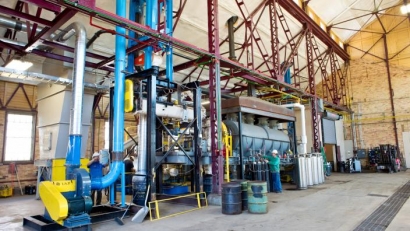
The emissions have no heavy metal pollutants and greatly reduced sulfur levels. As an added benefit, the biomass feedstock can be invasive plants, woody and agricultural waste, secondary wood species, and beetle-killed wood resources.
The researchers say this could be used as a supplement to fossil coal. It could potentially aid in the reduction of harmful coal emissions to meet state and federal mandates while minimizing new financial investment requirements at existing power plants.
“What’s really exciting, and what we’ve been working so hard on, is being able to produce this product at a commercially-relevant scale,” said Don Fosnacht, NRRI initiative director for Renewable Energy. “We had to find a way to make it physically robust and water-resistant for easy shipping and handling, and scale it up to 6 tons per day output. It wasn’t easy.”
NRRI helped to monitor a significant trial of solid biofuel at a Portland electric plant in 2017. They replaced the fossil coal with 3,500 tons of biofuel with only minor mechanical changes. This trial demonstrated that this similar biofuel provides roughly 2,500 BTU per pound increase over typical output for Powder River Basin coals.
The biofuel can be made with two processes: Torrefaction (a dry roasting method) or Hydrothermal Carbonization (a pressure cooking method).
“If you think about how Mother Nature made fossil coal, it’s time, pressure and heat,” explained NRRI Engineer Tim Hagen. “We’re doing those same processes, but instead of millions of years, we’re doing it in a few hours. And because minerals don’t get into the mix, we don’t have those potential pollutants.”
NRRI is now gearing up for the next steps of biofuel development. Using a high pressure gasification process on the solid fuels, they hope to demonstrate the conversion of the solid biofuel into a synthetic natural gas (sometimes called “syngas”). Other products would be high value chemicals, liquid fuels and activated carbon.
NRRI’s renewable energy research was funded by a grant from Xcel Energy, Minnesota Next Generation Energy Board/MN Dept. of Agriculture, Minnesota Power, Heetway, K.R.Komarek, Inc. and the Consortium for Advanced Wood to Energy Solutions.
Photo courtesy NRRI

